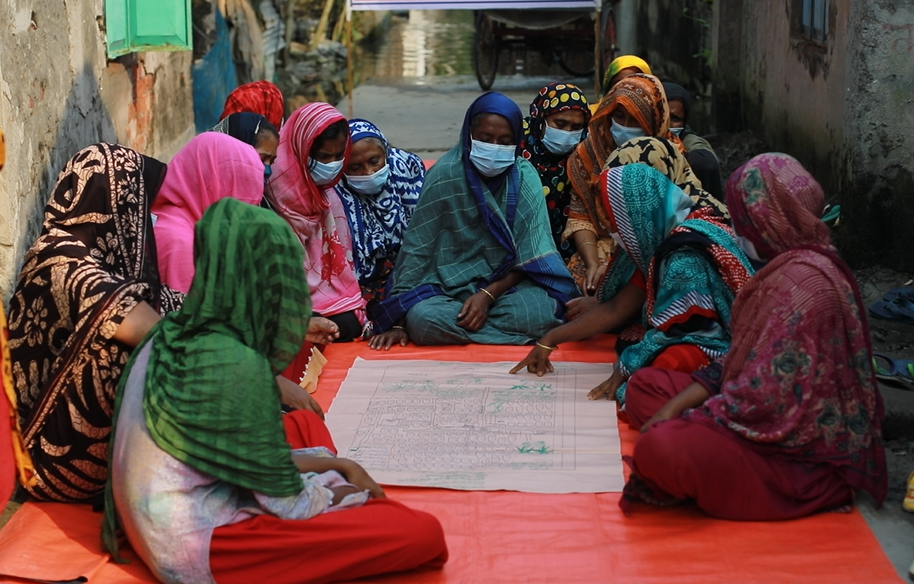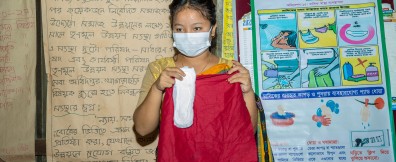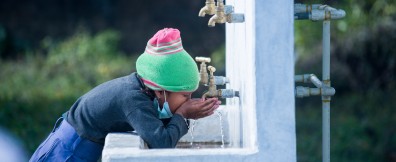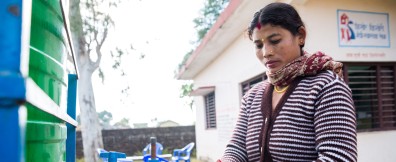Patience and cultural sensitivity: key factors for system change in WASH
Learnings from the WASH SDG WAI sub-programme in Bangladesh led by Simavi show the importance of locally-led interventions for lasting change.

Patience and cultural sensitivity have not always been the strongholds of development cooperation to put it mildly. And high-income countries still need to be very critical towards their ways of working. Haste and white saviourism often favour quick fixes and technical solutions.
At Simavi, we believe that nation states are ultimately responsible to realise the human rights to water and sanitation. When states fail to do so, civil society can play an important role in holding states accountable to the people and communities they serve. We believe civil society, women and girls, and their communities understand best what is needed in their country or community. That is why Simavi does not provide communities with water and sanitation services directly. We see it as our role to support civil society, women and girls, and their communities to claim their rights.
A recent report on Best Practices for Sustainable Impact in WASH Promotion by The Broker, an independent knowledge brokering organisation in the field of sustainable international development, identifies patience and cultural sensitivity as key factors for achieving sustainable impact in Water, Sanitation and Hygiene (WASH). The report highlights several examples of how these factors have contributed to the success of the WASH SDG WAI Sub-programme in Bangladesh, which we will summarise in this article.
1. Sensitivities around female WASH entrepreneurship
The private WASH sector is traditionally dominated by men. Supporting female WASH entrepreneurship, which has been part of the system change approach of the WASH SDG programme, can serve as a catalyst for socio-economic women’s empowerment. Furthermore, on the customer side, it is easier for women to interact with female entrepreneurs about the sanitary facilities in the household than with male entrepreneurs. Therefore, female WASH entrepreneurship makes it more likely that women’s needs are given due attention in sanitary service provision.
However, there are sensitivities around female WASH entrepreneurship. Hope for the Poorest (HP), one of the partners in Bangladesh working on the WASH SDG programme, is very aware of these and always makes sure to carefully assess the local context before training and coaching a participant. That is why they organise extensive discussions with a participant’s family and influential members of the wider community in the neighbourhood, especially with those who may be critical of the idea. In such discussions, HP officers make sure not to condemn them for their views. Instead, they engage with them in order to convince them of the benefits. This way, HP aims to take away the fear that becoming a WASH entrepreneur diminishes a woman’s respect or ability to be a good mother. Introducing influential members of the community to women who have become successful WASH entrepreneurs also proved helpful. Across the programme, more than 400 entrepreneurs were successfully supported, out of which 169 were female.
HP also sets up interactions between women who are potentially interested in becoming WASH entrepreneurs but who have some doubts and women from a similar background who have become successful female WASH entrepreneurs. As many women do not know of other female WASH entrepreneurs, and because traditional social norms dictate that it is a male profession, introducing potential participants to role models is a very effective way of helping them to envision a future WASH entrepreneurship role for themselves.
Having patience and understanding sensitivities can also be about seemingly simple things, like going to the wholesale market to buy equipment. Such markets tend to be male-dominated places, and as a starting female entrepreneur it can be difficult to feel confident about assessing if something is of good quality for an acceptable price. This can turn a trip to the market into a daunting prospect. Training and coaching along the way have proven to be key factors for women to be able to successfully start their journey as a WASH entrepreneur.
For a case in point of a woman taking the journey to becoming a WASH entrepreneur, please watch the video below!
2. Overcoming taboos concerning menstrual health management facilities at schools
The patient approach can also be seen in the work of the partners Uttaran, Development Organization of the Rural Poor (DORP), IDEA and Stichting Land Ontwikkelings Project Bangladesh (SLOPB) to promote the establishment of menstrual health management (MHM) facilities at schools and, in a general sense, more open discussions of menstrual health. The lack of such discussions and of dedicated facilities has led to significantly higher rates of absenteeism among girls as it makes them feel unsafe coming to school during their menstruation.
Many schools do not have any dedicated WASH facilities for girls at all, let alone specific menstrual health corners where they can get access to and dispose of sanitary napkins. Sometimes, the problem is just to get the conversation off the ground as menstrual health is considered a taboo subject to talk about. Local partners come to the school and facilitate such discussions.
At other times, though, there may be active resistance on the part of more conservative individuals on the School Management Committee to the idea of promoting open discussions of girls’ menstrual health and providing dedicated facilities. Such cases have demanded a more cautious and patient approach by the Uttaran team, gradually trying to convince them that providing MHM-facilities will improve their students’ well-being, reduce absenteeism and improve school performance, a core objective of the management committee.
Uttaran would come to the school every few months to talk with small groups of students in order to create a safe environment. Staff members would use a dedicated guidebook to discuss the biological aspect of menstruation as well as menstrual health practices such as the use of sanitary napkins.
Making sure that you have at least some influential people, such as the local government education officer and one or two senior member(s) of the School Management Committee, on your side before discussing the issue with the entire committee was also part of the strategy in order to slowly convince more sceptical committee members. In total, the programme successfully supported the establishment of 95 Menstrual Health Management facilities at schools.
3. Patient reform in the Tea Garden areas
A particularly challenging environment was faced by WaterAid Bangladesh (WAB) and its local partner IDEA in trying to improve WASH governance in the Tea Garden areas in Moulvibazar District in north-eastern Bangladesh. This is an area with a highly particular institutional history. In colonial times it was run by the tea estates, an institutional model that found some form of continuation in the form of the Tea Garden Authorities after independence. The Tea Garden Authorities lease land from the government, but some regard it as effectively being a state within the state as these authorities are also responsible for public service provision in the area.
However, the Tea Garden Authorities, institutionally falling under the Ministry of Commerce’s Tea Board, are primarily focussed on sustaining competitive tea exports, even if this means very low wages for the tea plantation workers. General living conditions, including in terms of available WASH facilities, are much lower than in other parts of the country.
The Tea Garden authorities have been reticent to let the central government’s WASH department deploy activities and make investments in the area, and they have been even more suspicious of letting NGOs like WAB and IDEA work there, fearing that they will mobilise labour unrest. Getting anything done in such a challenging political and institutional environment is extremely difficult.
WAB and IDEA had to adopt a patient approach, engaging the local authorities through local volunteers. Together, they sought to convince the authorities that it is also in their own interest to ensure better WASH conditions for the plantation workers. Better conditions will improve the workers’ health and well-being and, as a result, their ability to work on the plantations.
With the newly revised Pro-Poor WASH Strategy in hand, which had been adopted at the level of central government, WAB and IDEA carefully started mobilising and coaching different actors to demand change. They started with the local labour unions, who act on behalf of the tea plantation workers. Then the Ponchait, or the traditional local leaders, were approached, who are selected by the tea plantation workers communities to interact with the Tea Garden authorities on issues of social welfare. And thirdly, the lowest-tier civil servants were involved, who previously had not asked the central government for financial allocations for the WASH sector in the Tea Garden area, based on the understanding that this was the responsibility of the Tea Garden Authorities.
By pro-actively disseminating and discussing the new Pro-Poor WASH Strategy of the central government with all these different actors, WAB and IDEA started building momentum for these actors to engage with more powerful actors higher up, both within the Tea Garden Authorities and within the central government. They started insisting that there is in fact a need for the central government to become more engaged in the region and to allocate resources for WASH services in the Tea Garden areas. After all, the Pro-Poor WASH Strategy is a national strategy that is valid for all Bangladeshis, including the Tea Garden communities.
Conclusion
In conclusion, achieving sustainable impact in WASH requires more than just technical expertise and funding. These examples demonstrate the importance of patience and cultural sensitivity in promoting sustainable impact in WASH. By taking the time to listen to the needs and concerns of communities, engaging with local leaders, and working to break down cultural taboos, WASH programmes can achieve lasting change that is culturally appropriate and sustainable.
These examples have also shown that achieving sustainable impact in WASH is not easy. It requires a long-term perspective, geared towards systemic changes. It also requires the flexibility to engage in true learning-by-doing, adjusting interventions along the way. Funding agencies must recognise the importance of these factors and be willing to provide the space and resources needed to achieve sustainable impact in WASH.
Read the full report Access to Safe Water & Sanitation for All: Best Practices and Approaches from the WASH SDG WAI Sub-Programme in Bangladesh below:





